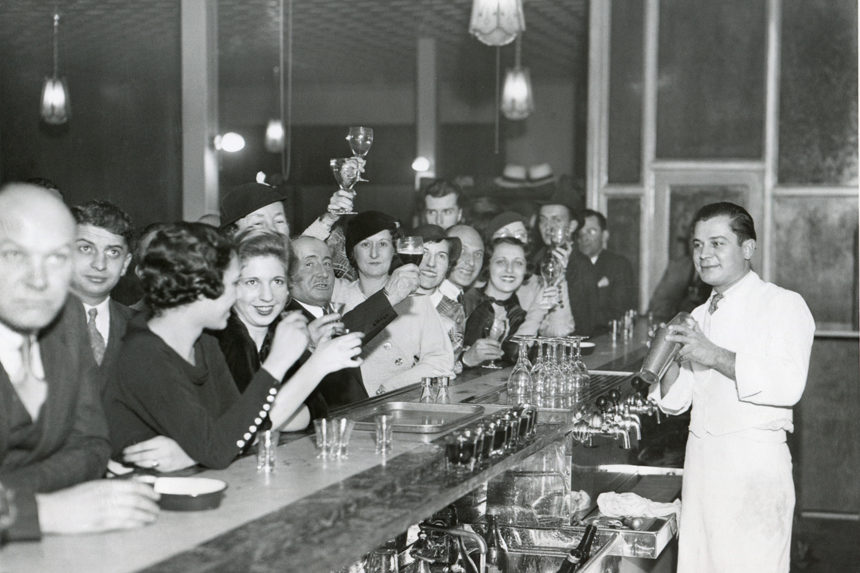“Your Health Checkup” is our online column by Dr. Douglas Zipes, an internationally acclaimed cardiologist, professor, author, inventor, and authority on pacing and electrophysiology. Dr. Zipes is also a contributor to The Saturday Evening Post print magazine. Subscribe to receive thoughtful articles, new fiction, health and wellness advice, and gems from our archive.
Order Dr. Zipes’ books, Ari’s Spoon, a new novel, as well as Bear’s Promise and Damn the Naysayers, A Doctor’s Memoir. Check out his website at dougzipes.com.
America tried to rid itself of alcohol once before and found that Prohibition was a disastrous failure that spawned an industry of illicit manufacturing, transporting, and selling — and of course drinking. Speakeasies sprouted like mushrooms, memorialized in many books and movies like The Great Gatsby. The U.S. Congress passed alcohol prohibition laws in 1917, adopted as the 18th Amendment to the Constitution in 1919. Religious consumption of wine was exempted, as was home production of limited amounts. The 21st Amendment 13 years later reversed this course due to public outcry, growth of illegal activity, and decline of governmental tax revenues after the 1929 Depression. The “wets” defeated the “drys” and have held the upper hand ever since.
But today there is a burgeoning temperance movement, not from a legal standpoint, but instead inspired by health considerations.
It reminds me of the current smoking status. When I trained as a physician at Duke Hospital in the late 1960s, one could smell tobacco in the air during an evening stroll through downtown Durham. Smoking and smokers were everywhere: planes, restaurants, homes, hospital rooms — even catheterization labs. In the 1960s, a well-known cardiologist who performed early coronary angiographies is said to have used a hemostat to pick up a cigarette (to avoid contaminating his gloves) to smoke during heart catheterizations.
Today, smoking is banned literally all over — not by constitutional amendments but because medical science proved its adverse health effects, which led to the social movement making it taboo. Of course there will always be smokers, just as there will always be drinkers. Individual freedoms will prevail and permit smokers and drinkers to do as they please, regardless of the health consequences.
But could the same fall from grace that occurred to smoking befall alcohol as we begin to appreciate its harmful effects? Recent data support the conclusion that no amount of alcohol is beneficial, and any amount is harmful to your heart and other organs in proportion to the frequency and quantity consumed.
As I noted previously, an episode of atrial fibrillation several years ago caused me to “cold-turkey sharing a bottle of wine with my wife at dinner and drinking an occasional vodka before bedtime” because I knew that alcohol was an established precipitator of that arrhythmia. Substituting tonic water, nonalcoholic beer, or even coffee has so far abolished recurrent AF episodes (knock on wood!).
Abstinence might be particularly relevant as we enter a new year and consider resolutions to improve our lives. And contemplating the burgeoning number of establishments that serve nonalcoholic drinks, the drys are gaining ground on the wets. Mocktails — nonalcoholic cousins to the usual cocktail — appear with increasing frequency on menus in restaurants and bars across the country and have taken the boring out of alcohol-free drinks.
More than 3 out of 5 adults who have ever smoked have quit. Hopefully, in the years to come, the same statistic might apply to drinking alcohol.
However, at least two major differences distinguish smoking cessation from alcohol abstinence and may prevent this from happening. One is that smoke often bothered nonsmokers in the vicinity of the smoker, which helped lead to its ban. The second is that nondrinkers often feel socially compelled to drink, such as at parties and celebrations.
Whether alcohol abstinence is approaching the end of its beginning, or the beginning of its end, is too early to judge. At the very least, however, we can hope for moderation to comport with the U.S. guidelines of one drink per day for women and two for men.
Become a Saturday Evening Post member and enjoy unlimited access. Subscribe now




Comments
I can’t say I’m an angel because I occasionally take myself a shot of moonshine to relax or help go to sleep. But I am not an abuser of alcohol. I witnessed my best friend killing himself not only with alcohol abuse but by being a heavy smoker too, pass away a shade over a year ago at age 68. He never saw his oldest grandchild graduate from high school. My dad on the other hand smoked himself to death. I never saw him drink but my younger brother said he did on occasion. In any regard, he never witnessed my oldest child and his oldest grandchild graduate as he passed away one year before she graduated at age 73. I’m not going to deride someone who smokes or drinks. I just want to give them advice. Practice sensible moderation of either vice. Your loved ones will thank you for doing so.
Growing up in the 1960’s my parents never drank or smoked. Therefore, I never desired either. I can proudly say that I have been smoke and alcohol free for all of my 69 years. My children and grandchildren have never partaken of said vices either. I am thankful for parents who didn’t succumb to popular devices as I was growing up. Their detourent was the part in the Bible where it says that your body is a temple of the Holy Spirit and we shouldn’t defile it.
I quit smoking decades ago. I stopped drinking 5 years ago. The benefits have been invaluable. It is freeing and empowering. I highly recommend removing both from your life.
We can all breathe easier since nearly all indoor smoking was banned sometime in the late 1980’s, with more limitations that followed. Unfortunately, we’ve all had that unfortunate experience of walking to or away from our cars in a parking lot, and accidentally getting a breath of the toxic odor, even to this day. Hate it when they’re right outside a building I’m entering or exiting. More laws still need to be enacted to address that.
Cigarettes smell treacherously worse today than decades ago; obviously poisoned-up intended to keep the people smoking hooked despite everything. I can remember hanging up my suit jacket once home from work with the scent still there the next morning up to and including 1986.
Some people can smoke and live to quite an old age. It makes me think of the mother in the new Post fiction story ‘Shush, Shush’ where the son first visits his mother in a facility back to age 12 in 1968 where the smoke was terrible, and still visits her to this day in (what I presume is) a modern, smoke-free board and care type residence. Probably in her mid-90s, we also presume she no longer smokes; but she might, on the sly, outside.
I got class credit in high school (12th grade) for helping out the nurses at a board & care home on the week days, visiting residents/patients, (some smoking in their rooms) setting the tables in the dining room for dinner, and such. In the hospital section, I remember one woman who had to have oxygen due to smoking, being in a zippered plastic “bubble” and certain nurses indulging her in cigarettes as they held them, and she puffed away.
Alcohol is something people need to know the facts on, and make hopefully make wise choices. I liked a Kamikze or two during lunch with work friends in the mid-’80s, but stopped in ’86, never drinking again. A conscious decision I’ve never regretted. Feeling a little sloshed in the afternoon was nice for awhile, but realized wasn’t healthy. Mocktails have been on my list of favorite beverages for years when I want the vibe without the health penalties in social situations. Very glad to read here you no longer have AF episodes, Dr. Zipes.